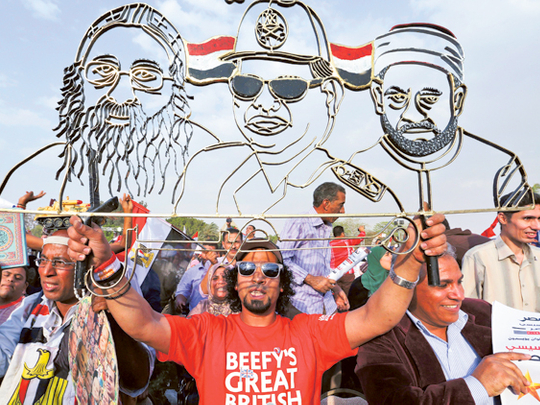
Cairo: A year ago, Sally Majdy, a Christian Egyptian bank employee, thought seriously of migrating along with her family to Australia for fear of their future under the Islamists, the then rulers of Egypt — but not any more.
“I feel that the days ahead will be good for Egypt after the new president is elected,” Majdy, 39, said.
“Whether the new president will be Abdul Fattah Al Sissi or Hamdeen Sabahi, I think Christians feel that Egypt has become their homeland again,” she said, referring to the two Muslim contenders in this month’s presidential elections.
“Both believe that Egypt should be a country for all Egyptians without discrimination.”
Christians, who make up around 10 per cent of Egypt’s predominantly Muslim 85 million population, expressed concerns about the rise of Islamists to power after a 2011 uprising forced long-time president Hosni Mubarak to step down.
During the one-year rule of Islamist president Mohammad Mursi, who was deposed by the military in July last year, Christians reported attacks on their places of worship and property allegedly carried out by Muslim militants.
In the wake of Mursi’s ouster, scores of churches mainly in southern Egypt were torched by the Islamist leader’s supporters, who accused Christians of backing his removal.
Coptic Pope Tawadross II publicly endorsed the toppling of Mursi, Egypt’s first freely elected president.
Egyptians go to polls on May 26-27 to elect a new president in a two-candidate race expected to be won by Al Sissi, a former army chief who led the overthrow of Mursi of the Muslim Brotherhood.
Like many Christians, Majdy is enthusiastic about supporting Al Sissi. “He is the most capable of ending the chaos in Egypt and ensuring equality among all Egyptians,’ she said.
“He is a strong statesman, who can also efficiently manage the economy and restore to Egypt its deserved status in the world.”
Egypt has been hit by political and street turmoil that has taken a toll on its economy and security for more than three years now. Al Sissi has announced that if elected president, he will give priority to re-establishing stability and economic revival.
Although the Church has said it does not favour a certain presidential contender, some Christian clerics have gone public with their choices. “Of course Al Sissi is my president,” prominent Bishop Mousa said in a recent tweet.
Last month when Sabahi went to the main cathedral in Cairo to offer Easter greetings, some Christian celebrants waved Al Sissi’s portraits in his presence.
However, some Christians plan to vote for Sabahi, a leftist politician who came third in the 2012 presidential elections that Mursi won.
“Besides his firm belief in equality and social justice, Sabahi is the biggest guarantee that the Mubarak regime will not return to power in one way or another,” said Munir Najeeb, a Christian engineering student said. Al Sissi’s critics say his election will signal a return to Mubarak’s autocracy.
“Even before he becomes a president, Al Sissi is surrounded by figures from the Mubarak regime.
“Moreover, compared to Sabahi, Al Sissi has not shown a strong commitment to democracy and respect for human rights. He keeps talking about stability as Mubarak used to do.”
Christians often complained about alleged state indiscrimination and persecution by radical Islamists under Mubarak, an ex-army officer, who ruled Egypt for almost 30 years.












